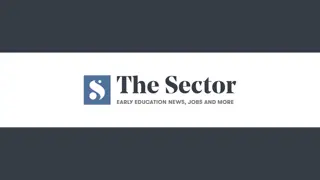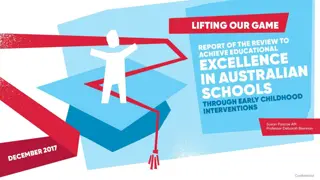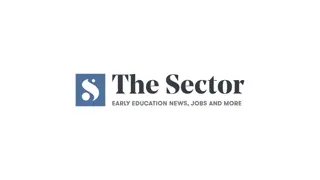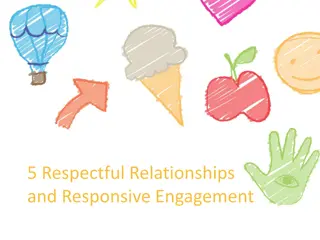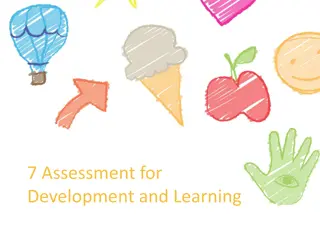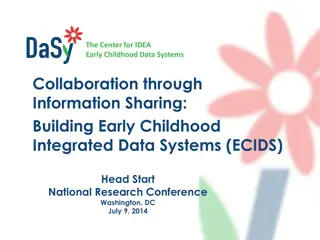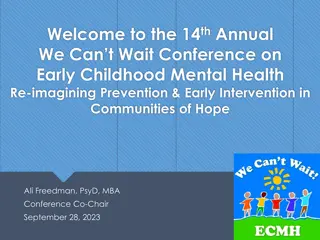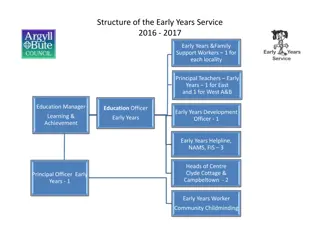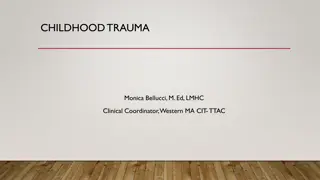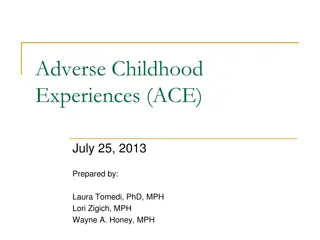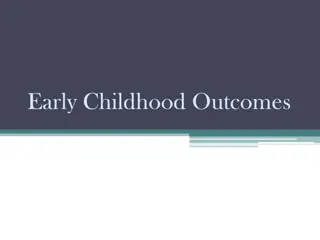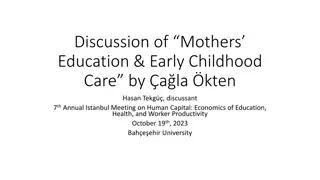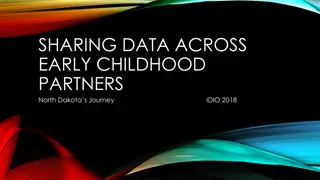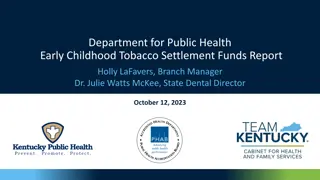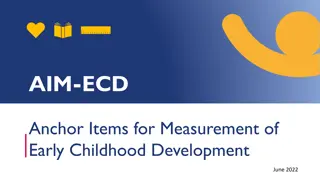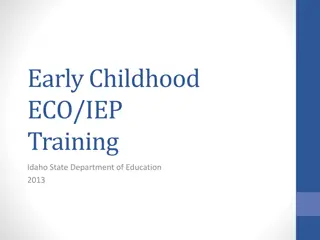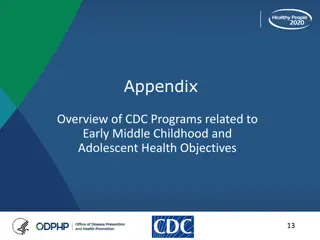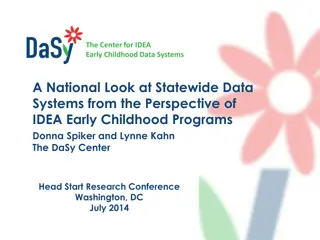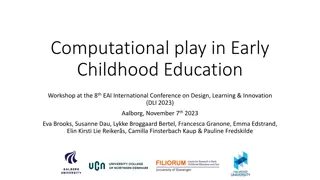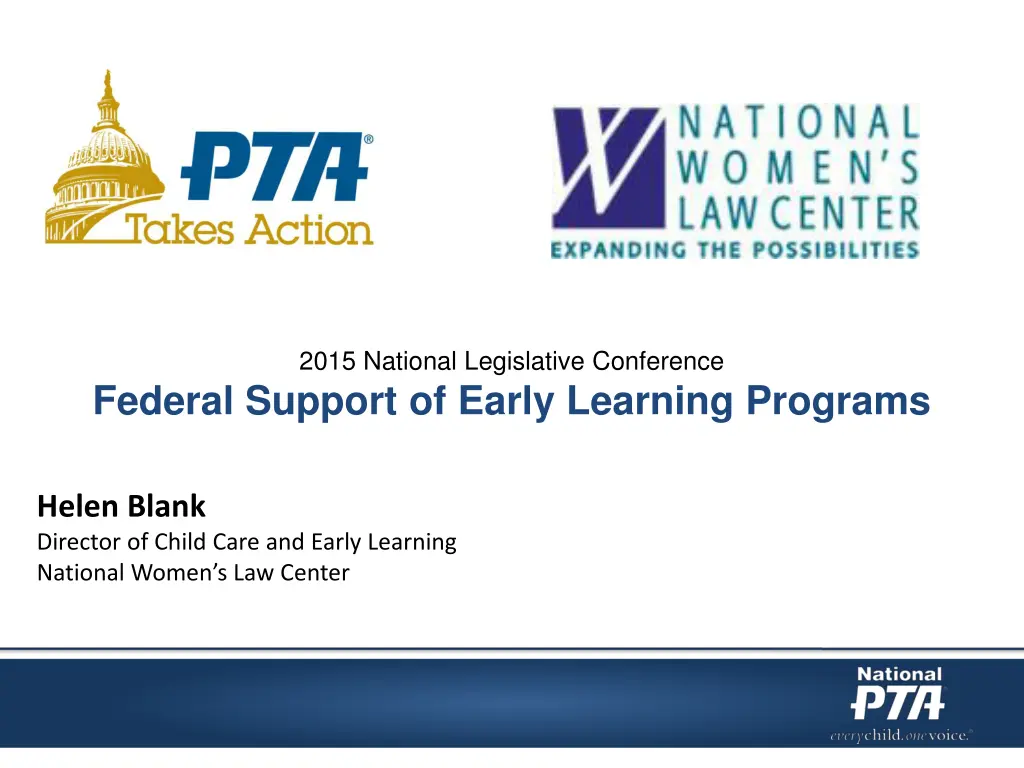
Federal Support of Early Learning Programs and Current Initiatives
Explore the importance of investing in early childhood education, the benefits it brings, current federal programs supporting early learning, and the commitment of organizations like PTA in enhancing access to quality child care and preschool programs. Stay informed on key updates and advocacy efforts in the field.
Download Presentation

Please find below an Image/Link to download the presentation.
The content on the website is provided AS IS for your information and personal use only. It may not be sold, licensed, or shared on other websites without obtaining consent from the author. If you encounter any issues during the download, it is possible that the publisher has removed the file from their server.
You are allowed to download the files provided on this website for personal or commercial use, subject to the condition that they are used lawfully. All files are the property of their respective owners.
The content on the website is provided AS IS for your information and personal use only. It may not be sold, licensed, or shared on other websites without obtaining consent from the author.
E N D
Presentation Transcript
2015 National Legislative Conference Federal Support of Early Learning Programs Helen Blank Director of Child Care and Early Learning National Women s Law Center
Agenda 1. PTA s Commitment to Early Education 2. Key Federal Early Childhood Care and Education Programs 3. Federal Early Childhood Education Updates 4. Q&A
PTAs Commitment to Early Education PTA supports federal and state incentives for high-quality child care and preschool programs for children ages 0 to 5. These programs should be: Affordable Accessible Developmentally appropriate Coordinated at all levels (federal, state, local) Characterized by high standards for teaching, training, health, and safety PTA strongly encourages the inclusion of a robust family engagement component in all early education programs.
Early Childhood Education Benefits We cannot afford to postpone investing in children until they become adults, nor can we wait until they reach school age a time when it may be too late to intervene. Learning is a dynamic process and is most effective when it begins at a young age and continues through adulthood. --James Heckman, Ph.D, Nobel Laureate Economics, University of Chicago
Current Federal Early Education Programs Department of Education Elementary and Secondary Education Act (ESEA) Early Learning Challenge Fund (with HHS) Grants for Infants and Families (Part C of IDEA) Preschool Grants (Part B Section 619 of IDEA) Department of Health and Human Services Head Start/Early Head Start Child Care and Development Block Grant (CCDBG) Maternal, Infant, and Early Childhood Home Visiting Program (MIECHV)
Current Federal Early Education Programs Elementary and Secondary Education Act Description: Title I funds can be used, at the local educational agency s discretion, for early childhood programs Population: Less than 5% of ESEA funds spent on children younger than kindergarten age Current Status: ESEA reauthorization pending, advocates seeking an Early Learning Program
Current Federal Early Education Programs Head Start Description: Established in 1965, 80% federal/20% local match serving the poorest children and families with comprehensive standards and services Education Parent Involvement Health Social Services Population: Serves 3-4 year old low-income children Serves less than half of eligible children
Current Federal Early Education Programs Early Head Start Description: Established in 1994; provides comprehensive child development and family support services Population: Serves low-income infants and toddlers from birth to three years and pregnant women Serves less than 5% of eligible infants, toddlers, and pregnant women
Current Federal Early Education Programs Head Start-Early Head Start (Continued) Last reauthorized in 2007 FY 2014 and FY 2015 appropriations include $500 million for Early Head Start/ Child care Partnerships
Current Federal Early Education Programs Child Care and Development Block Grant Enacted in 1990, CCDBG is the primary source of federal funding for child care and after school subsidies and quality improvements; promotes family economic self-sufficiency and school readiness Supports low-income working families and families with parents in school or in training
Current Federal Early Education Programs CCDBG (continued) CCDBG provides assistance to one out of six eligible children In 2013, CCDBG served 315,000 fewer children than in 2006 Status: Reauthorized in 2014 with significant new requirements without adequate funding
Current Federal Early Education Programs Maternal, Infant, and Early Childhood Home Visiting Program Description: Established in 2010 under the Affordable Care Act; provides voluntary home visiting programs to improve health and development outcomes for at-risk children by addressing issues including maternal and child health, parenting practices, safe home environments, and access to services Serves expectant parents and families with new babies and young children Status: Funding expires March 31, 2015
EARLY CHILDHOOD EDUCATION Federal Policy Updates
Presidents Early Learning Initiative In 2013, called on Congress to expand access to high-quality preschool to every child in America Proposed a series of new investments to establish a continuum of high-quality early learning birth to age 5
Strong Start for Americas Children Act Introduced last Congress with bipartisan support Three Key Components: 1. Preschool -- Development Grants and Preschool for All 2. Early Head Start/Child Care partnerships 3. MIECHV
Strong Start-Preschool for All Establishes a federal-state partnership to provide access to high-quality prekindergarten programs for all low-income and moderate-income 4-year-old children. Also provides Preschool Development Grants HIGH QUALITY PREKINDERGARTEN Highly-qualified teachers who are paid comparably to K-12 Offers full-day Developmentally appropriate teaching/curricula Evidence-based comprehensive child services: Parent and family engagement Nutritious meals Health screening and referrals Small class sizes; low child:staff ratio
FY 2015 Funding CCBBG: Plus $75 million Preschool Development Grants: $500 million (Level funded) - Currently helping 18 states develop and expand high quality preschool programs in targeted communities Head Start and Early Head Start: Level funded
Presidents FY 2016 Budget Child Care and Development Block Grant: -Additional $82 billion over ten years to make child care and assistance available to all children under age four in families with incomes up to 200 percent of poverty - To receive the additional funding, states would be required to develop plans for building the supply of high-quality care for infants and toddlers and ensure that provider payment rates are sufficient to cover the cost of high-quality care and that parent co-payments are reasonable
Presidents FY 2016 Budget Child Care and Development Block Grant (continued): - Includes $266 million to help states implement new provisions of the CCDBG reauthorization and $100 million for new Child Care Pilots for Working Families that will test innovative strategies for addressing unmet child care needs
Presidents FY 2016 Budget Child and Dependent Care Tax Credit: - Increases to a maximum of $3,000 for a family with one child under age five in child care and $6,000 for a family with two or more children under age five, for families with incomes up to $120,000 -The credit would remain nonrefundable
Presidents FY 2016 Budget Head Start: - Increases funding for Head Start/Early Head Start to $10.1 billion (from $8.6 million) - Early Head Start Child Care Partnerships would rise to $650 million (from $500 million) - $1.08 billion would allow all Head Start programs to operate for at least a full school day (6 hours a day) and full school year (170 days a year), and $284 million for a cost of living increase
Presidents FY 2016 Budget Preschool Development Grants: -Includes $750 million for Preschool Development Grants, an increase from $250 million in FY 2015
Presidents FY 2016 Budget Preschool for All: - Requests $1.3 billion the first year to expand access to high-quality preschool to all four- year-olds in low- and moderate-income families - Proposing $75 million over 10 years, paid for with a tobacco tax increase
PTA Believes that Every Child Deserves a #STRONGSTART

